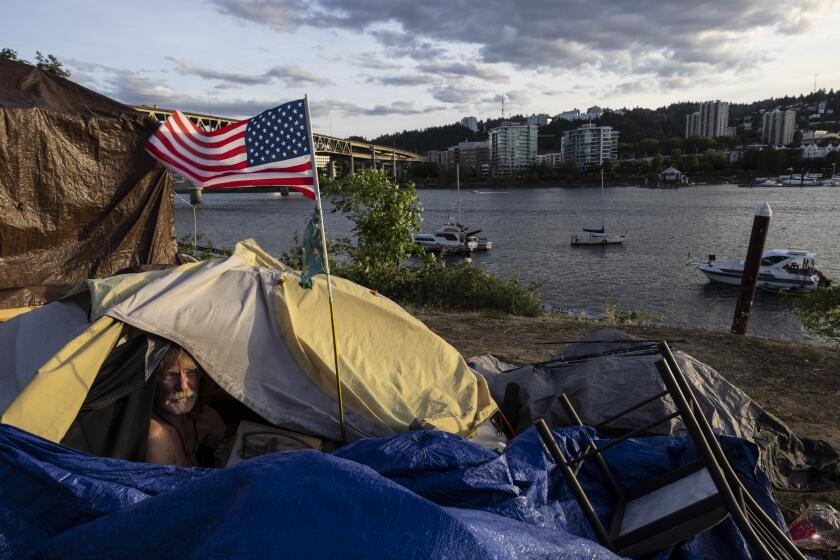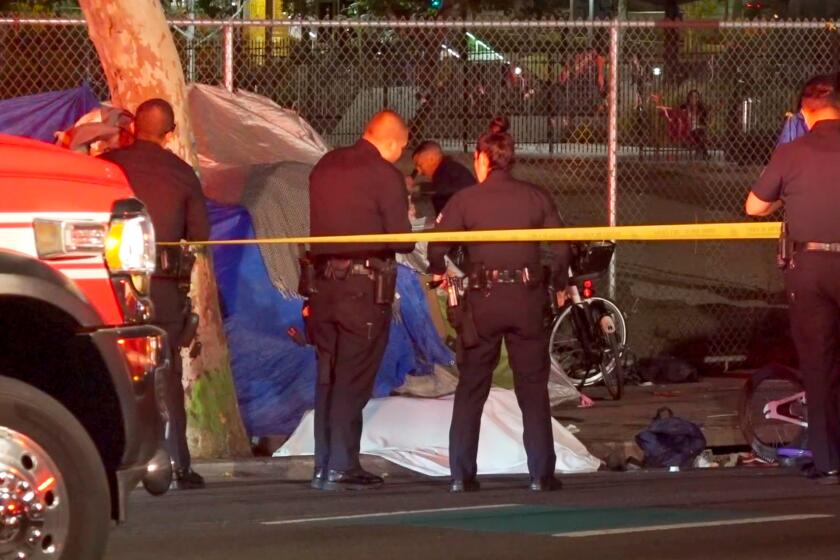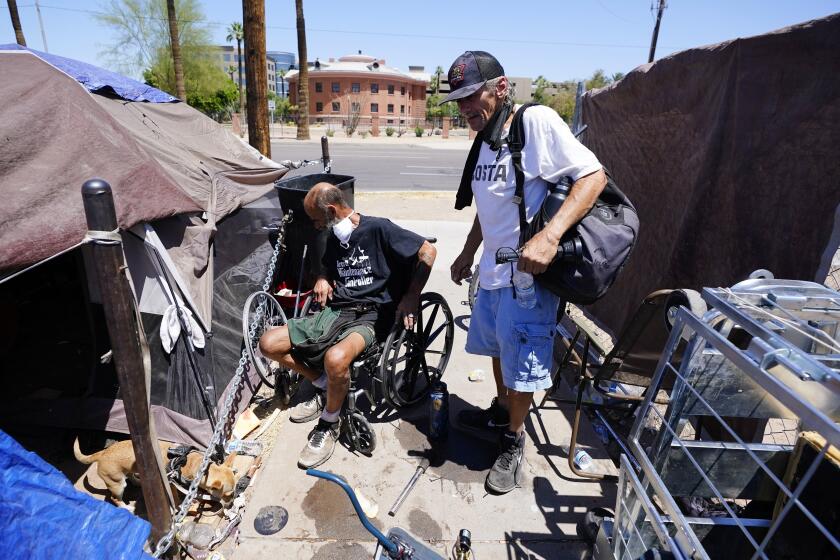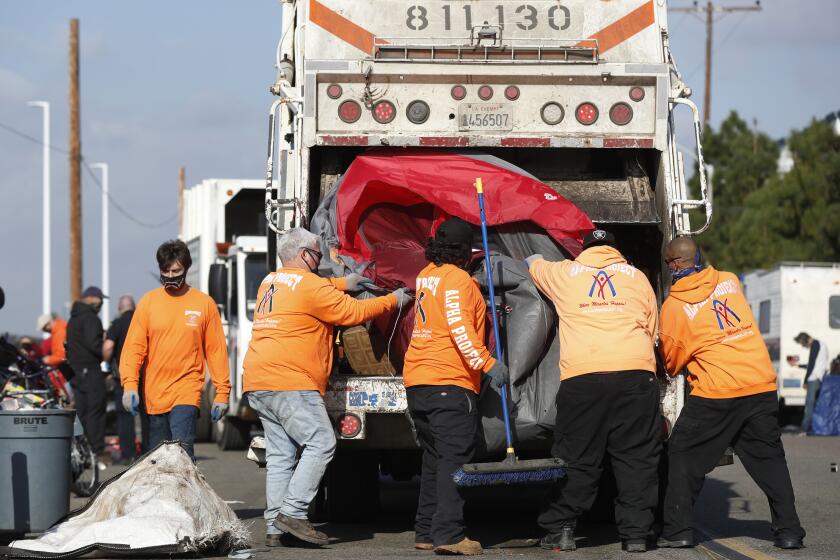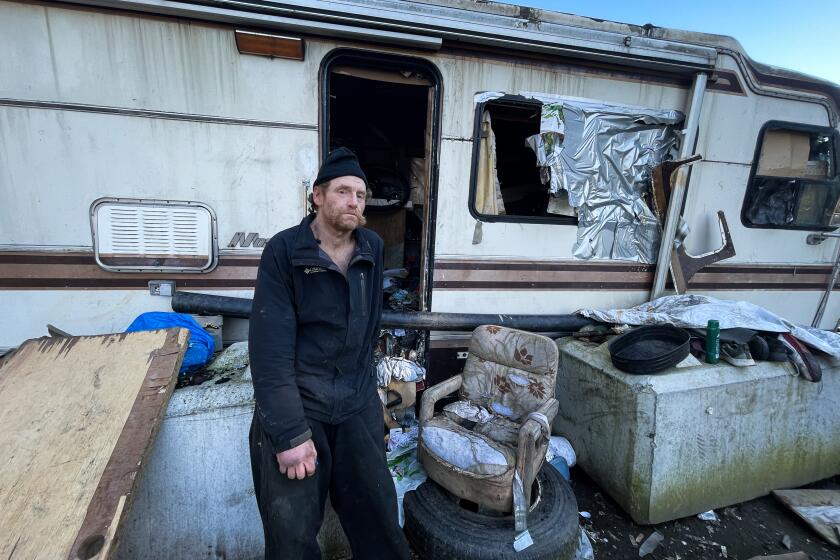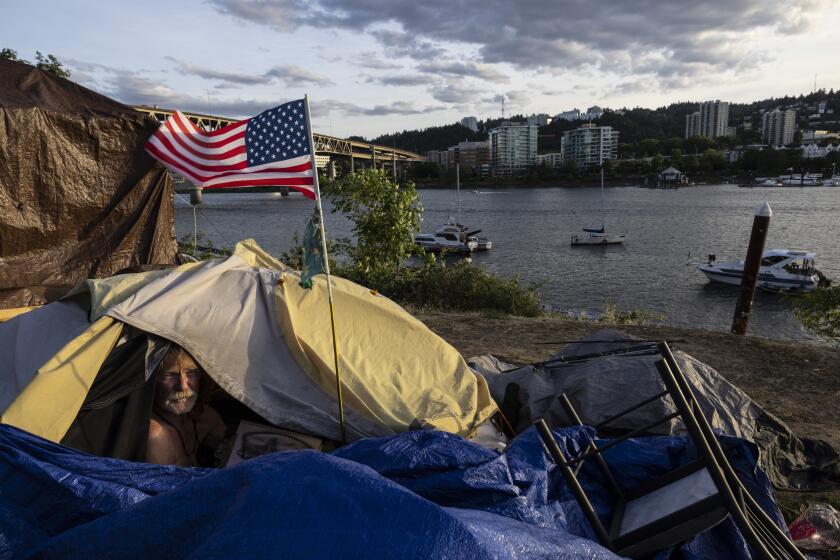Cities crack down on homeless encampments. Advocates say that’s not the answer
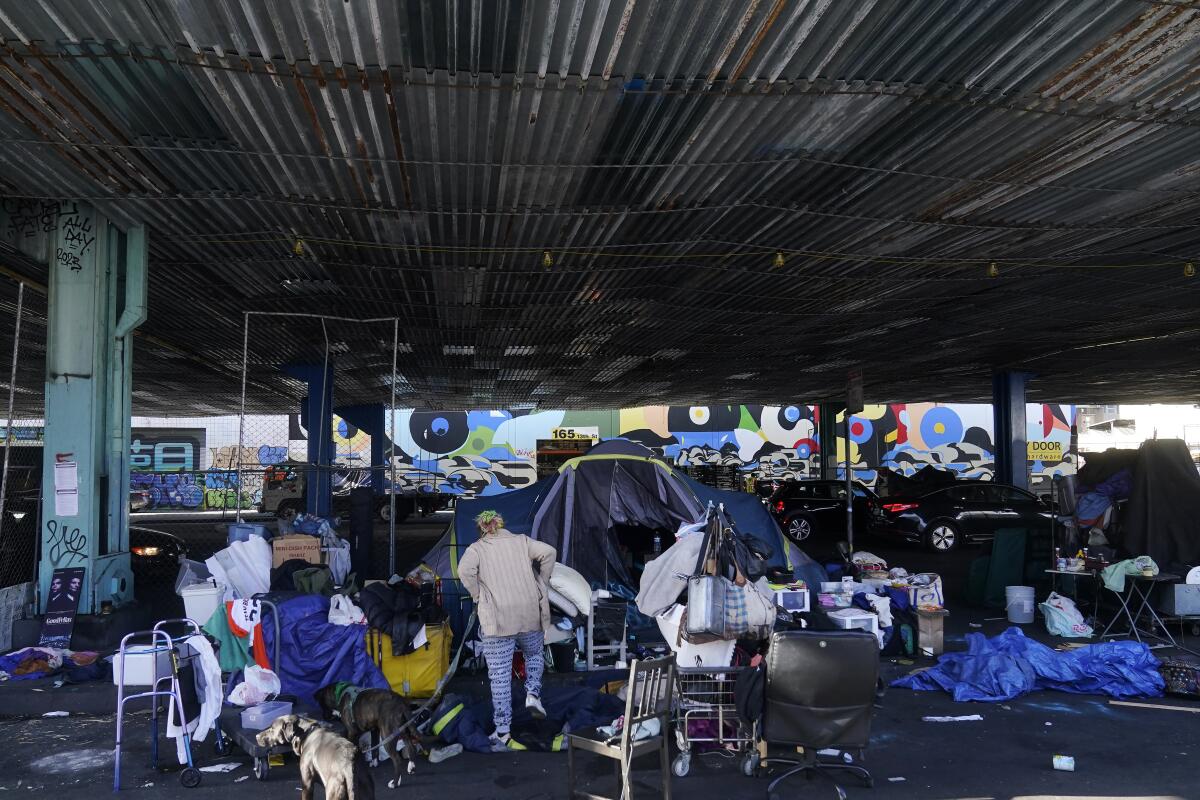
- Share via
PORTLAND, Ore. — Tossing tent poles, blankets and a duffel bag into a shopping cart and three wagons, Will Taylor spent a summer morning helping friends tear down what had been their home and that of about a dozen others. It wasn’t the first time and wouldn’t be the last.
Contractors from the city of Portland, Ore., had arrived to break down tents and tarps on a side street behind a busy intersection, and people had an hour to vacate. Whatever they couldn’t take with them was placed in plastic bags, tagged with the date and location, and sent for storage in an 11,000-square-foot warehouse.
“It can get hard,” said Taylor, 32, who has been moved at least three times in the four years he’s been homeless. “It is what it is. … I just let it go.”
Tent encampments have long been a fixture of West Coast cities, but are now spreading visibly across the U.S. The federal count of homeless people reached 580,000 last year, driven by lack of affordable housing and a pandemic that economically wrecked households. Encampments are also generating more controversy because of homeless people with severe mental illness and drug addictions who refuse treatment or don’t have access to programs.
Portland, Ore., long a famously progressive city, faces a crisis of confidence as it grapples with homelessness and crime. Residents can’t agree on solutions.
Records obtained by the Associated Press show attempts to clear encampments increased in cities from Los Angeles to New York as public pressure grew to address what are dangerous and unsanitary living conditions. But despite tens of millions of dollars spent in recent years, there appears to be little reduction in the number of tents propped up on sidewalks, in parks and by freeway off-ramps.
Homeless people and their advocates say the sweeps are cruel and a waste of taxpayer money. They say the answer is more housing, not crackdowns.
The AP submitted data requests to 30 U.S. cities regarding encampment sweeps and received at least partial responses from about half.
In Phoenix, the number of encampments swept soared to more than 3,000 last year from 1,200 in 2019. Las Vegas removed about 2,500 camps through September, up from 1,600 in 2021. And in Minneapolis, camp removals have more than doubled from last year to 44 through Nov. 9, according to city records.
The city of Los Angeles said its sanitation department responded to more than 4,000 requests a month from the public to address homeless encampments at the end of 2022, double the amount the previous year.
A 30-year-old man who is believed to have been homeless was fatally shot around 3 a.m. at an encampment next to Grand Park.
But it would not explain whether that meant the encampments were dismantled or simply cleaned around or even how large the encampments were.
But even cities without data confirmed camping is consuming more time, and they are starting to track numbers, budget for removals, and beef up or launch programs to connect people to housing.
State and local laws criminalizing homelessness are on the rise, said Scout Katovich, a staff attorney with the American Civil Liberties Union, which has filed lawsuits challenging the constitutionality of sweeps and property seizures in a dozen cities, including Miami, Anchorage and Boulder, Colo.
“These laws and these practices of enforcement do nothing to actually alleviate the crisis and instead they keep people in this vicious cycle of poverty,” she said.
But California Gov. Gavin Newsom, whose state is home to nearly one-third of the country’s homeless population, says leaving hazardous makeshift camps to fester is neither compassionate nor an option.
Hundreds of homeless people die in the streets each year from the heat, in cities around the U.S. and the world.
He is among officials urging the U.S. Supreme Court to take up a 9th Circuit appellate court ruling that prohibits local governments from clearing encampments without first assuring everyone is offered a bed indoors. San Francisco is under a court order to enforce the ruling.
“I hope this goes to the Supreme Court,” said Newsom, a former mayor of San Francisco, in a September interview with news outlet Politico. “And that’s a hell of a statement coming from a progressive Democrat.”
Earlier this month, crews in Denver erected metal fencing as police officers called to residents to leave a sprawling downtown encampment. A bonfire blazed against temperatures in the teens and snow covered the ground.
“The word ‘sweep’ that they use ... that’s kind of how it feels, like being swept like trash,” said David Sjoberg, 35. “I mean we’re not trash, we’re people.”
Removing encampments is costly — an expense more cities, counties and states have to budget for. Several cities queried by the AP provided some costs, but others said comprehensive figures were difficult to get given the multiple departments involved, including police, sanitation and public health.
A lack of affordable housing is a key factor, according to a study of the nation’s major areas.
Still, Denver reported spending nearly $600,000 on labor and waste disposal in 2021 and 2022 to clean 230 large encampments, some more than once. Phoenix said it spent nearly $1 million last year to clear encampments.
Despite all that spending, said San Francisco real estate broker Masood Samereie, businesses keep losing customers because of people camped on sidewalks, some clearly in mental distress. “It’s throwing money at it without any tangible or any real results,” he said.
For homeless people, sweeps can be traumatizing. They often lose identification documents, as well as cellphones, laptops and personal items.
Roxanne Simonson, 60, said she had a panic attack during one sweep in Portland and started yelling for an ambulance. “And then I changed my mind, because if I go, then I would lose all my stuff,” she said.
But cities can’t stand by and do nothing, said Sam Dodge, who oversees a San Francisco city department that coordinates multiple agencies to place people into housing so crews can clear tents.
“Saying, ‘This is not working, this is dangerous, you can do better than this, you have a brighter future than this,’ I think that’s caring for people,” Dodge said.
Homeless encampments now spill well beyond Portland’s downtown core, dividing a city that has invested liberally in support services.
One August morning, his crew surveyed about a dozen structures and tents, some inches away from vehicles zipping by. Outreach workers fanned out, asking people if they had a case manager or wanted a room indoors.
City officials are particularly frustrated by people who have housing, but won’t stay in it.
Michael Johnson, 40, was assigned a coveted one-room pre-fabricated structure with a bed, desk and chair, a window and locking door. But his friends aren’t there and to him, it feels like jail, so he’s sleeping in a tent.
Many cities say they link camp residents to housing, but track records are mixed. For example, a June New York City comptroller’s report said more than 2,300 people were forcibly removed from encampments from March to November 2022. Only 119 accepted temporary shelter, and just three eventually got permanent housing.
Advocates for homeless people say there are not enough temporary beds, permanent housing or social services and there are many reasons why someone might reject shelter. Some have been assaulted in one, or say there are too many rules to follow.
Focusing on policing, drugs and crime in cities like Portland diverts attention from where it really belongs: on price gouging in housing.
But sometimes, they don’t want to pare down their belongings, or follow rules that prohibit drugs and drinking, officials say.
Encampments were not a serious issue in Minneapolis until the pandemic, when they became more commonplace and much larger, drawing thousands of complaints. In response, the city closed down more than two dozen sites where 383 people were camped from March 2022 until February.
At the same time, Hennepin County, which includes Minneapolis, launched a program last year aimed at finding short- and long-term housing for homeless people, including some living in encampments.
“We are hyper-focused on housing,” said Danielle Werder, manager of the county’s Office to End Homelessness. “We’re not walking around with socks and water bottles. We’re walking around saying, ‘What do you need?’”
Thomas Peipert, Angeliki Kastanis and Christopher Weber of the AP contributed to this report.
More to Read
Sign up for Essential California
The most important California stories and recommendations in your inbox every morning.
You may occasionally receive promotional content from the Los Angeles Times.
